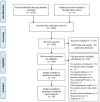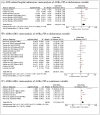Potentially inappropriate prescribing and its associations with health-related and system-related outcomes in hospitalised older adults: A systematic review and meta-analysis
- PMID: 34008195
- PMCID: PMC8597090
- DOI: 10.1111/bcp.14870
Potentially inappropriate prescribing and its associations with health-related and system-related outcomes in hospitalised older adults: A systematic review and meta-analysis
Abstract
Aims: To synthesise associations of potentially inappropriate prescribing (PIP) with health-related and system-related outcomes in inpatient hospital settings.
Methods: Six electronic databases were searched: Medline Complete, EMBASE, CINAHL, PyscInfo, IPA and Cochrane library. Studies published between 1 January 1991 and 31 January 2021 investigating associations between PIP and health-related and system-related outcomes of older adults in hospital settings, were included. A random effects model was employed using the generic inverse variance method to pool risk estimates.
Results: Overall, 63 studies were included. Pooled risk estimates did not show a significant association with all-cause mortality (adjusted odds ratio [AOR] 1.10, 95% confidence interval [CI] 0.90-1.36; adjusted hazard ratio 1.02, 83% CI 0.90-1.16), and hospital readmission (AOR 1.11, 95% CI 0.76-1.63; adjusted hazard ratio 1.02, 95% CI 0.89-1.18). PIP was associated with 91%, 60% and 26% increased odds of adverse drug event-related hospital admissions (AOR 1.91, 95% CI 1.21-3.01), functional decline (AOR 1.60, 95% CI 1.28-2.01), and adverse drug reactions and adverse drug events (AOR 1.26, 95% CI 1.11-1.43), respectively. PIP was associated with falls (2/2 studies). The impact of PIP on emergency department visits, length of stay, and health-related quality of life was inconclusive. Economic cost of PIP reported in 3 studies, comprised various cost estimation methods.
Conclusions: PIP was significantly associated with a range of health-related and system-related outcomes. It is important to optimise older adults' prescriptions to facilitate improved outcomes of care.
Keywords: Beers criteria; STOPP/START; inappropriate medication; inappropriate prescribing; medication therapy management; prescribing omissions.
© 2021 The Authors. British Journal of Clinical Pharmacology published by John Wiley & Sons Ltd on behalf of British Pharmacological Society.
Conflict of interest statement
There are no competing interests to declare.
Figures





References
-
- United Nations, Department of Economic and Social Affairs, Population Division . 2017. World Population Ageing 2017―Highlights (ST/ESA/SER.A/397). https://www.un.org/en/development/desa/population/publications/pdf/agein.... Accessed October 12, 2020.
-
- Salive ME. Multimorbidity in older adults. Epidemiol Rev. 2013;35(1):75‐83. - PubMed
-
- Gnjidic D, Hilmer SN, Blyth FM, et al. Polypharmacy cutoff and outcomes: five or more medicines were used to identify community‐dwelling older men at risk of different adverse outcomes. J Clin Epidemiol. 2012;65(9):989‐995. - PubMed
Publication types
MeSH terms
LinkOut - more resources
Full Text Sources
Other Literature Sources
Medical

